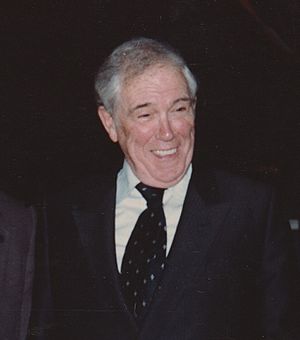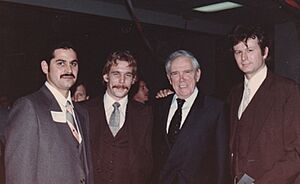Douglas Fraser facts for kids
Douglas Andrew Fraser (December 18, 1916 – February 23, 2008) was an important union leader from Scotland and America. He was the president of the United Auto Workers (UAW) union from 1977 to 1983. He also taught about labor relations at Wayne State University for many years.
Douglas Fraser is best known for helping to save the car company Chrysler from going out of business in 1979. He worked hard to get the U.S. Congress to give Chrysler a loan. He also convinced union workers to agree to some pay cuts and changes to help the company survive.
Quick facts for kids
Douglas Fraser
|
|
|---|---|
 |
|
| 6th President of the United Auto Workers | |
| In office May 19, 1977 – May 19, 1983 |
|
| Preceded by | Leonard Woodcock |
| Succeeded by | Owen Bieber |
| Personal details | |
| Born | December 18, 1916 Glasgow, Scotland |
| Died | February 23, 2008 (aged 91) Southfield, Michigan, U.S. |
Contents
Growing Up in Douglas Fraser's Early Life
Douglas Fraser was born in Glasgow, Scotland, on December 18, 1916. His father, Samuel, was an electrician and a strong supporter of unions. His family was very poor.
In 1922, when Douglas was a young boy, his father moved to Detroit, Michigan. In 1923, Douglas, his mother, sister, and brother sailed to New York City. They arrived at Ellis Island and then traveled by train to their new home in Detroit.
The Great Depression deeply affected Douglas. His father often did not have work. Douglas saw a lot of poverty and social problems, which changed his life. He left high school at age 18. He then worked in a machine shop and took several jobs in the car industry.
Douglas Fraser's Start in the Union
Fraser found work as a metal finisher at one of Chrysler's DeSoto factories. He became active in the union there in 1936. He was fired twice because of his union beliefs and activities. He also took part in sitdown strikes at Chrysler.
In 1943, Fraser was elected president of UAW Local 227. He served in the U.S. Army during World War II.
After the war, Fraser quickly moved up in the UAW. He became an international representative in 1947. During a long strike at Chrysler in 1950, his negotiating skills impressed many UAW staff members. In 1951, he joined the personal team of UAW President Walter Reuther.
In 1959, he was elected a co-director of a UAW region. In 1962, he became a member of the UAW's international board. Reuther then made him director of several UAW departments, including Chrysler. In 1970, he was elected a vice-president of the international union.
Fraser helped with many successful union agreements. These included an early retirement program in 1964 and equal pay for U.S. and Canadian members in 1967. When Walter Reuther died in a plane crash in 1970, many thought Fraser would become the next union leader. However, Leonard Woodcock became president instead.
Fraser led a nine-day strike against Chrysler in 1973. The agreement reached after this strike included rules about forced overtime. It also brought a health and safety program, better early retirement plans, and new dental care benefits. A new system was also created to solve worker complaints faster.
Leading the UAW Union
Fraser was the president of the UAW from 1977 to 1983. He became president after Leonard Woodcock reached the union's required retirement age.
He is most famous for his role in helping Chrysler in 1979. The company was facing bankruptcy. Fraser worked to give the union a bigger say in how the company was run. He gathered UAW members and strongly asked Congress for help. This was key to convincing the government to provide $1.2 billion in loans. These loans helped Chrysler avoid going out of business.
Fraser convinced UAW members that big changes were needed to save the company. He negotiated pay cuts for workers and allowed Chrysler to reduce its workforce by nearly 50,000 jobs. In a very unusual step, Chrysler Corporation asked Fraser to join its Board of Directors. He served on the board from 1980 to 1984. He was the first labor leader to sit on the board of a major American company.
In 1982, Fraser negotiated more agreements with car companies. The economic downturn in the early 1980s hit the Ford Motor Company very hard. To help save Ford, Fraser negotiated important pay and benefit cuts. He made sure similar agreements were made with General Motors. This helped keep wages fair across the entire car industry.
Some people did not agree with Fraser's negotiations in 1979. They argued that the Chrysler agreement led to similar pay cuts in other industries like steel and trucking. They also claimed that the good relationship between unions and companies changed after 1979.
Douglas Fraser's Social Work
Fraser was involved in politics his whole life. He was a Democrat and a strong supporter of liberal ideas.
He was very progressive on social issues. He strongly supported the Civil Rights Movement. He also supported desegregation busing in public schools, even though some union members disagreed. He started programs within the UAW and the car industry to hire more minorities and women. He also pushed for national health insurance for everyone.
Life After Retirement
Fraser retired as UAW president in 1983. For many years, he was a professor at Wayne State University. He taught about labor relations and labor history. A major research center, the Douglas A. Fraser Center for Workplace Issues, was named after him.
He received an Award of Excellence for his important contributions to life in America.
Douglas Fraser's Passing
Douglas Fraser passed away on February 23, 2008. He died from problems related to emphysema at Providence Hospital in Southfield, Michigan.
Images for kids
Quotes from Douglas Fraser
- "The Chrysler workers saved the Chrysler Corporation."
- "Size alone I don't think is the only measurement for a labor union. It's vitality. Your resources are more limited, but it's how you spend those resources. If you spend them on communications and organization and political activity, you can be a very viable force with a much smaller number than we had in the past."
- "I believe leaders of the business community, with few exceptions, have chosen to wage a one-sided class war today in our country—a war against working people, the unemployed, the poor, the minorities, the very young and the very old, and even many in the middle class of our society."
- "I would rather sit with the rural poor, the desperate children of urban blight, the victims of racism, and working people seeking a better life than with those whose religion is the status quo, whose goal is profit and whose hearts are cold."
- "That’s not an adequate answer. ... Business is about making money, but labor leaders are supposed to be about helping workers." (in response to AFL-CIO President John Sweeney's assertion: "There is no more corruption in unions than there is in business or in Congress.")
 | Percy Lavon Julian |
 | Katherine Johnson |
 | George Washington Carver |
 | Annie Easley |




